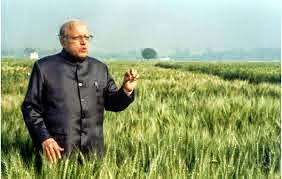Ever-green Revolution is the only pathway: Dr.MS Swaminathan : 6.

Citizens’ Consultative Councils will help to promote more enlightened and informed discussions on the issues involved. Parliament has recently approved an Atomic Energy Regulatory Authority Bill. The Bill provides for an autonomous and professionally credible and competent Regulatory Body. It is obvious that a Regulatory Body should not be under the control of the persons to be regulated, which was the case until recently. Ultimately, regulation alone will not be adequate for achieving public acceptance. Education and social mobilisation through elected Local Bodies are equally important. The statement Mahatma Gandhi made over eigh decades ago that “India lives in its villages” is valid even today. The 2011 census has shown that nearly seventy per cent of our population of 120 crore live in villages. Rural poverty is more serious than urban poverty since most of the rural women and men depend on agriculture which is a high risk profession for their livelihood...




.jpg)
.jpg)